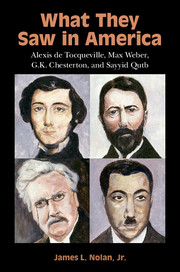Book contents
- Frontmatter
- Dedication
- Contents
- Acknowledgments
- Introduction
- 1 Pride, Patriotism, and the Mercantilist Spirit: Tocqueville and Beaumont Discover America
- 2 Tocqueville and the Quandary of American Democracy
- 3 Agrarianism, Race, and the End of Romanticism: Weber in Early Twentieth-Century America
- 4 Weber on Sects, Schools, and the Spirit of Capitalism
- 5 A New Martin Chuzzlewit: Chesterton on Main Street
- 6 Chestertonian Distributism and the Democratic Ideal
- 7 From Musha to New York: Qutb Encounters American Jahiliyya
- 8 Qutb's “Inquiring Eyes” in Colorado and California
- Conclusion
- Notes
- References
- Index
2 - Tocqueville and the Quandary of American Democracy
Published online by Cambridge University Press: 05 April 2016
- Frontmatter
- Dedication
- Contents
- Acknowledgments
- Introduction
- 1 Pride, Patriotism, and the Mercantilist Spirit: Tocqueville and Beaumont Discover America
- 2 Tocqueville and the Quandary of American Democracy
- 3 Agrarianism, Race, and the End of Romanticism: Weber in Early Twentieth-Century America
- 4 Weber on Sects, Schools, and the Spirit of Capitalism
- 5 A New Martin Chuzzlewit: Chesterton on Main Street
- 6 Chestertonian Distributism and the Democratic Ideal
- 7 From Musha to New York: Qutb Encounters American Jahiliyya
- 8 Qutb's “Inquiring Eyes” in Colorado and California
- Conclusion
- Notes
- References
- Index
Summary
Having completed their journeys to Canada and the western frontier of the United States, Tocqueville and Beaumont ventured back to America's eastern cities. Traveling by steamship down Lake Champlain, the French visitors returned to Albany on September 4. Anxious to get to Boston, where letters from France awaited them, they departed Albany by stagecoach on September 6 and arrived in Boston on the 9th, making only one stop along the way – in Stockbridge, Massachusetts, at the home of Catherine Maria Sedgwick. Miss Sedgwick had been recommended to them as one of the leading female novelists in America at the time. Unfortunately, she was not home on the day of their visit. Other members of the Sedgwick clan, however, were present, including the novelist's young nephew, Theodore Sedgwick, who would one day become Tocqueville's research assistant in Paris and, subsequently, a close friend with whom he would correspond until the end of his life.
In Boston, Tocqueville received the sad news that his beloved Bébé had died. “Never in my life have I felt so painfully disconsolate,” he wrote to his brother Édouard. “I hope eventually to recover from this blow, but there will always be a void that neither time nor friendship nor the future … can fill.” It was in Boston that Tocqueville and Beaumont first learned that the French interior ministry wanted them to shorten their journey and return soon to France. Evidently, there was concern that the French commissioners were not fully attending to their purported task of studying American prisons – it had, after all, been two months since they last visited a prison. In spite of these unwelcome pieces of news, the time spent in Boston proved invaluable and highly informative for Tocqueville and Beaumont. They found the city very agreeable and more cultured and less commercially oriented than New York. Beaumont wrote to his brother, “This is unquestionably the most interesting city we've seen until now.” And more than 20 years after returning to France, Tocqueville still favorably recalled his time in Boston. “Boston seemed to me the most pleasant city to live in. There I found a great number of educated and pleasant people, and if I had had to settle somewhere in America, I believe I would have chosen Boston.”
- Type
- Chapter
- Information
- What They Saw in AmericaAlexis de Tocqueville, Max Weber, G. K. Chesterton, and Sayyid Qutb, pp. 36 - 65Publisher: Cambridge University PressPrint publication year: 2016

